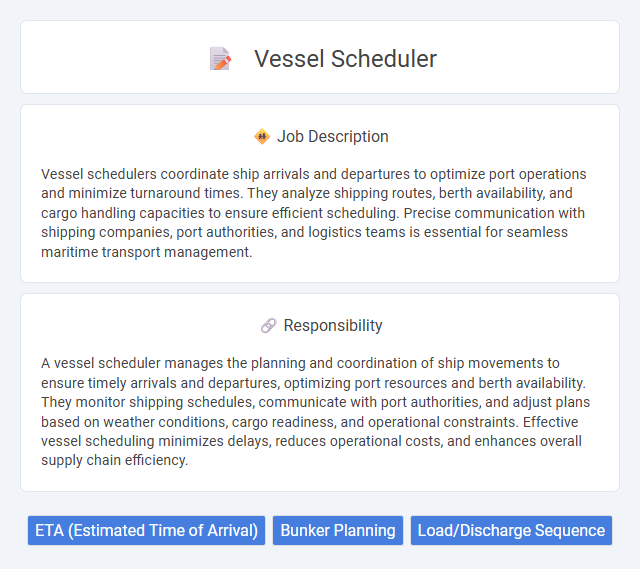
Vessel schedulers coordinate ship arrivals and departures to optimize port operations and minimize turnaround times. They analyze shipping routes, berth availability, and cargo handling capacities to ensure efficient scheduling. Precise communication with shipping companies, port authorities, and logistics teams is essential for seamless maritime transport management.
People who thrive in vessel scheduler roles likely possess strong organizational skills and the ability to manage high-pressure situations efficiently. Candidates comfortable with multitasking, working irregular hours, and coordinating complex logistics may show a higher probability of success in this job. Those who prefer routine and minimal communication might find this role less suitable due to its dynamic and collaborative nature.
Qualification
A vessel scheduler must possess strong analytical skills and in-depth knowledge of maritime logistics and shipping operations, often requiring a bachelor's degree in logistics, supply chain management, or maritime studies. Proficiency in scheduling software, real-time tracking systems, and regulatory compliance is essential to optimize vessel routes and minimize delays. Prior experience in shipping coordination and excellent communication abilities are critical for liaising between port authorities, shipping agents, and crew members.
Responsibility
A vessel scheduler manages the planning and coordination of ship movements to ensure timely arrivals and departures, optimizing port resources and berth availability. They monitor shipping schedules, communicate with port authorities, and adjust plans based on weather conditions, cargo readiness, and operational constraints. Effective vessel scheduling minimizes delays, reduces operational costs, and enhances overall supply chain efficiency.
Benefit
Vessel scheduler roles likely offer significant benefits such as competitive salaries and opportunities for career advancement within the maritime and logistics industries. Employees in this position may experience enhanced organizational skills and operational knowledge, increasing their value in global supply chain management. The job might also provide exposure to dynamic work environments and international coordination, making it appealing for professionals seeking growth in transportation logistics.
Challenge
The vessel scheduler role likely involves managing complex logistics to optimize shipping routes and minimize delays, presenting a continuous challenge in balancing tight schedules with unpredictable factors such as weather or port congestion. This position may require rapid decision-making and adaptability to changing conditions to ensure timely vessel arrivals and departures. Given these demands, the job probably demands strong problem-solving skills and the ability to coordinate effectively with multiple stakeholders in a high-pressure environment.
Career Advancement
A Vessel Scheduler coordinates ship arrivals, departures, and cargo handling to ensure efficient maritime operations. Mastery of logistics software and deep understanding of international shipping regulations significantly enhance career prospects in this field. Advancing from coordinator to operations manager or logistics director roles is common for professionals who demonstrate strong problem-solving skills and leadership in vessel scheduling.
Key Terms
ETA (Estimated Time of Arrival)
Vessel schedulers play a crucial role in managing the Estimated Time of Arrival (ETA) to ensure seamless port operations and minimize delays. Accurate ETA forecasting involves analyzing real-time vessel positions, weather conditions, and port traffic to optimize scheduling and resource allocation. Enhancing ETA precision directly improves cargo handling efficiency and reduces demurrage costs.
Bunker Planning
Vessel schedulers specializing in bunker planning coordinate fuel supply logistics to ensure timely and efficient refueling of ships, optimizing fuel costs and reducing downtime. They analyze voyage schedules, bunker availability, and fuel quality standards to develop precise bunker consumption plans aligned with environmental regulations and company policies. Effective bunker planning requires close collaboration with suppliers, port authorities, and operations teams to synchronize delivery windows and maintain vessel operational efficiency.
Load/Discharge Sequence
Vessel schedulers coordinate the precise load and discharge sequence to maximize cargo efficiency while adhering to port regulations and vessel stability requirements. They analyze cargo types, weight distribution, and stowage plans to prevent delays and ensure safe operations. Accurate sequencing reduces turnaround time and enhances fleet reliability in maritime logistics.
 kuljobs.com
kuljobs.com